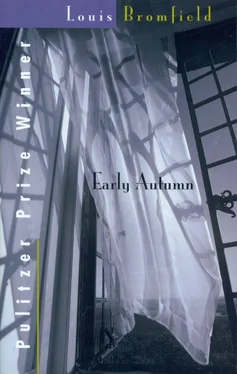She watched Sabine, so worldly, so superbly dressed, so hard—such a restless nomad; and as she watched her it occurred to her again that she was very like Aunt Cassie—an Aunt Cassie in revolt against Aunt Cassie’s gods, an Aunt Cassie, as John Pentland had said, “turned inside out.”
Without looking up from the pages of the Nouvelle Revue, Sabine said, “I’m glad this thing about Sybil is settled.”
“Yes.”
“He told you about his mother?”
“Yes.”
“You didn’t let that make any difference? You didn’t tell the others?”
“No. … Anything I had to say would have made no difference.”
“You were wise. … I think Thérèse is right, perhaps … righter than any of us. She says that nature has a contempt for marriage certificates. Respectability can’t turn decay into life … and Jean is alive. … So is his mother.”
“I know what you are driving at.”
“Certainly, my dear, you ought to know. You’ve suffered enough from it. And knowing his mother makes a difference. She’s no ordinary light woman, or even one who was weak enough to allow herself to be seduced. Once in fifty years there occurs a woman who can … how shall I say it? … get away with a thing like that. You have to be a great woman to do it. I don’t think it’s made much difference in her life, chiefly because she’s a woman of discretion and excellent taste. But it might have made a difference in Jean’s life if he had encountered a mother less wise than yourself.”
“I don’t know whether I’m being wise or not. I believe in him and I want Sybil to escape.”
Olivia understood that for the first time they were discussing the thing which none of them ever mentioned, the thing which up to now Sabine had only touched upon by insinuation. Sabine had turned away and stood looking out of the window across the meadows where the distant trees danced in waves of heat.
“You spoiled my summer a bit, Olivia dear, by taking away my Irish friend from me.”
Suddenly Olivia was angry as she was angry sometimes at the meddling of Aunt Cassie. “I didn’t take him away. I did everything possible to avoid him … until you came. It was you who threw us together. That’s why we’re all in a tangle now.” And she kept thinking what a strange woman Sabine Callendar really was, how intricate and unfathomable. She knew of no other woman in the world who could talk thus so dispassionately, so without emotion.
“I thought I’d have him to amuse,” she was saying, “and instead of that he only uses me as a confidante. He comes to me for advice about another woman. And that, as you know, isn’t very interesting. …”
Olivia sat suddenly erect. “What does he say? What right has he to do such a thing?”
“Because I’ve asked him to. When I first came here, I promised to help him. You see, I’m very friendly with you both. I want you both to be happy and … besides I can think of nothing happening which could give me greater pleasure.”
When Olivia did not answer her, she turned from the window and asked abruptly, “What are you going to do about him?”
Again Olivia thought it best not to answer, but Sabine went on pushing home her point relentlessly, “You must forgive me for speaking plainly, but I have a great affection for you both … and I … well, I have a sense of conscience in the affair.”
“You needn’t have. There’s nothing to have a conscience about.”
“You’re not being very honest.”
Suddenly Olivia burst out angrily, “And why should it concern you, Sabine … in the least? Why should I not do as I please, without interference?”
“Because, here … and you know this as well as I do … here such a thing is impossible.”
In a strange fashion she was suddenly afraid of Sabine, perhaps because she was so bent upon pushing things to a definite solution. It seemed to Olivia that she herself was losing all power of action, all capacity for anything save waiting, pretending, doing nothing.
“And I’m interested,” continued Sabine slowly, “because I can’t bear the tragic spectacle of another John Pentland and Mrs. Soames.”
“There won’t be,” said Olivia desperately. “My father-in-law is different from Michael.”
“That’s true.
“In a way … a finer man.” She found herself suddenly in the amazing position of actually defending Pentlands.
“But not,” said Sabine with a terrifying reasonableness, “so wise a one … or one so intelligent.”
“No. It’s impossible to say. …”
“A thing like this is likely to come only once to a woman.”
(“Why does she keep repeating the very things that I’ve been fighting all along,” thought Olivia.) Aloud she said, “Sabine, you must leave me in peace. It’s for me alone to settle.”
“I don’t want you to do a thing you will regret the rest of your life … bitterly.”
“You mean…”
“Oh, I mean simply to give him up.”
Again Olivia was silent, and Sabine asked suddenly, “Have you had a call from a Mr. Gavin? A gentleman with a bald head and a polished face?”
Olivia looked at her sharply. “How could you know that?”
“Because I sent him, my dear … for the same reason that I’m here now … because I wanted you to do something … to act. And I’m confessing now because I thought you ought to know the truth, since I’m going away. Otherwise you might think Aunt Cassie or Anson had done it … and trouble might come of that.”
Again Olivia said nothing; she was lost in a sadness over the thought that, after all, Sabine was no better than the others.
“It’s not easy to act in this house,” Sabine was saying. “It’s not easy to do anything but pretend and go on and on until at last you are an old woman and die. I did it to help you … for your own good.”
“That’s what Aunt Cassie always says.”
The shaft went home, for it silenced Sabine, and in the moment’s pause Sabine seemed less a woman than an amazing, disembodied, almost malevolent force. When she answered, it was with a shrug of the shoulders and a bitter smile which seemed doubly bitter on the frankly painted lips. “I suppose I am like Aunt Cassie. I mightn’t have been, though. … I might have been just a pleasant normal person … like Higgins or one of the servants.”
The strange speech found an echo in Olivia’s heart. Lately the same thought had come to her again and again—if only she could be simple like Higgins or the kitchen maid. Such a state seemed to her at the moment the most desirable thing in the world. It was perhaps this strange desire which led Sabine to surround herself with what Durham called “queer people,” who were, after all, simply people like Higgins and the kitchen maid who happened to occupy a higher place in society.
“The air here needs clearing,” Sabine was saying. “It needs a thunderstorm, and it can be cleared only by acting. … This affair of Jean and Sybil will help. We are all caught up in a tangle of thoughts and ideas … which don’t matter. … You can do it, Olivia. You can clear the air once and for all.”
Then for the first time Olivia thought she saw what lay behind all this intriguing of Sabine; for a moment she fancied that she saw what it was Sabine wanted more passionately than anything else in the world.
Aloud she said it, “I could clear the air, but it would also be the destruction of everything.”
Sabine looked at her directly. “Well? … and would you be sorry? Would you count it a loss? Would it make any difference?”
Impulsively she touched Sabine’s hand. “Sabine,” she said, without looking at her, “I’m fond of you. You know that. Please don’t talk any more about this … please, because I want to go on being fond of you … and I can’t otherwise. It’s our affair, mine and Michael’s … and I’m going to settle it, tonight perhaps, as soon as I can have a talk with him. … I can’t go on any longer.”
Читать дальше












